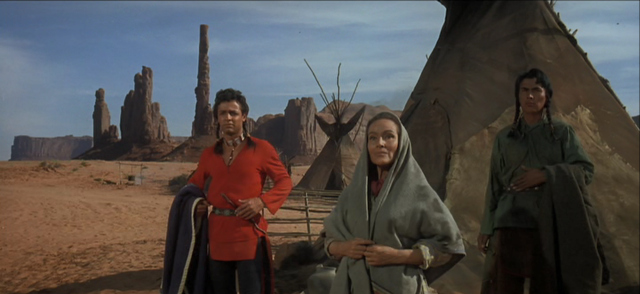
Cheyenne Autumn is full of such immaculately composed pictures.
John Ford’s final western film, Cheyenne Autumn (1964), has not received the critical or popular reappraisal that many of his other films were to achieve. Even the most favorable reviews tend to be measured in their praise, and mostly regarding the Oscar-nominated photography of William Clothier. This film was released in an era of overlong widescreen epics, many of whose runtime exceeds their value. But it is still a disappointment to witness the ambling structure of the episodic narrative coming from John Ford, whose best films are so often perfectly proportioned. A mere two years before Ford had released The Man who Shot Liberty Valance, a film that is vastly superior in pacing, characterization, and exploration of its chosen theme. Though Liberty Valance did not benefit from the majestic location footage in Ford’s beloved Monument Valley, it still manages to give a greater and more epic story in a similarly elegiac mood.
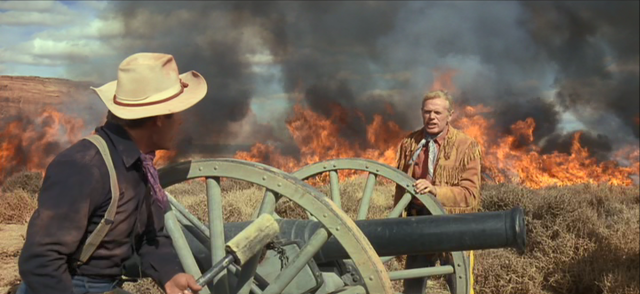
Richard Widmark has the best developed character in the film.
In Scott Eyman’s biography of John Ford, Print the Legend (a title drawn from a memorable line of dialogue in The Man Who Shot Liberty Valance), he tells the story of Cheyenne Autumn‘s production in terms of an older master who is losing his abilities due to the flagging energy of an aging spirit, further depleted by the ravages from a lifetime of alcoholism. Ford himself promoted the work as an attempt at reparations for years of unjust portrayals of Indians in Hollywood films. It seems likely that such an attempt, however well intentioned, could not produce a work of such power and subtlety as his many prior masterpieces, due to its insistent moralizing. Not helping matters are the kinds of casting of non-Indian actors such as Ricardo Montalban and Sal Mineo in the primary Native American roles. Though this was certainly not the hot-button issue in the 1960s that it has become today, it still seems a short sighted thing to ignore. In a film that was trying to change the depiction of Native Americans, Native Americans themselves would not be in the foreground of that representation. A film whose theme was about the White Man’s unjust oppression of the Cheyenne people, was still a story told by the white man, in this case John Ford.
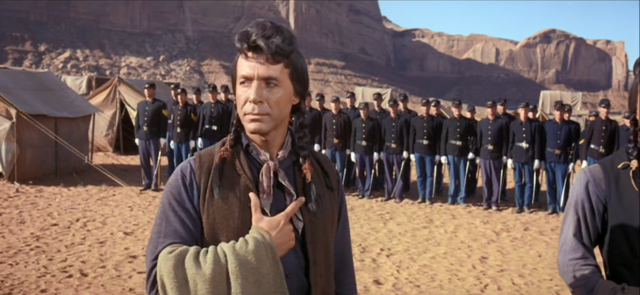
His betrayal will cause him to one day take sweet revenge on Captain Kirk…er, Archer.
Whatever the causes, Cheyenne Autumn is not a work that has been unjustly maligned. Taken as a whole, it’s simply not a great film. There are undoubtedly moments of beauty, especially visual beauty, and several poignant moments in the story of both the Cheyenne people who are on a deadly march to try to return to their homeland, and in the story of the cavalry regiment that is chasing them, led by Captain Archer (Richard Widmark). The comic interlude with James Stewart as Wyatt Earp, is amusing, but almost without any connection to the rest of the film. At one point, the studio had cut it out of the film. But even without that segment, the rest of the film is too insistent in making its point to rise to the level of Ford’s best work. Despite the length of the film, no character is afforded the complex characterization of a figure like The Searchers‘ Ethan Edwards. Nor are the communal aspects of either the Cheyenne or the cavalry regiment given the robust mixture of motivations and feelings that is seen in the Irish community in The Quiet Man.
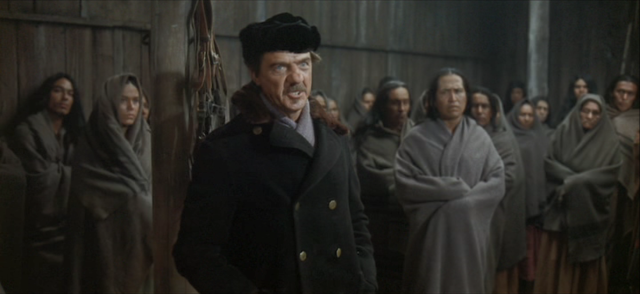
Captain Wessels here as Nazi commander?
A particularly unfortunate example of this is the character of Captain Oscar Wessels, played by Karl Malden. Malden, who had previously given some indelible screen performances, even in small roles, is given inadequate direction on this film. According to Scott Eyman, it had been rumored that Malden directed some of the picture himself when Ford was temporarily incapacitated, due to his use of pain pills after an injury during the production. Malden directly denied that, however, in an interview with the author. Eyman further recounted incidents that indicate indirectly why Malden’s part was ineffective, despite his manifest gifts as an actor. Blocking was repeated in different shots, indicating a tiredness in Ford’s imaginative vision. Despite Malden being a new actor to John Ford’s company, he was hardly given the type of harassment that was typical of Ford for newcomers. That harassment, while often harsh and inhumane, was the indicator that he was trying to goad an actor into their best performance, and often achieved just that. After a relatively mild amount of testing, Malden essentially was accepted into the fold and would join Ford and his circle at the daily tea breaks.
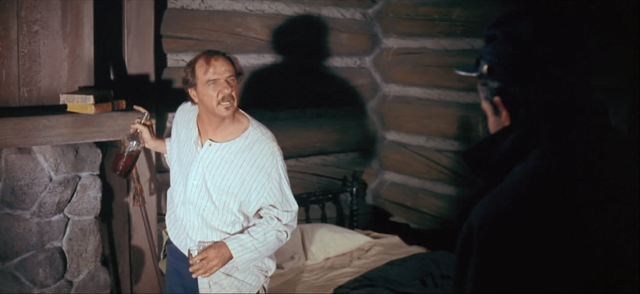
One of the rare negative portrayals of a drunk in a Ford picture.
Unfortunately, the result is not Malden’s best performance by a long shot. His Prussian accent seems inconsistent, and his turn from genial host into furious and hardhearted jailer seems wholly unconvincing. The captain begins by welcoming a portion of the starving Cheyennes into his fort, pleased with the notion that he will earn a promotion for their surrender. But rather than make reasonable human accommodations when supplies are low and conditions get tougher, he insists on obeying the letter of his orders. This leads to predictably tragic and violent consequences when the Indians decide to break out rather than freeze in captivity. But the resultant slaughter isn’t nearly as effective emotionally because of the one-note portrayal of the antagonist. I don’t fault the broad performance of Malden here as much as the rote direction which permitted or encouraged it.
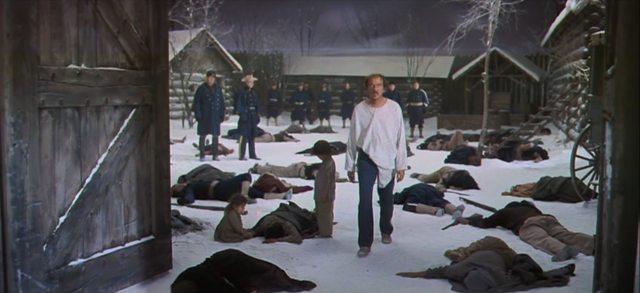
The bitter fallout of Wessels’s harsh confinement of the Cheyenne.
Malden’s German accent and insistence that his petty tyranny was merely the result of his following orders, has led some, notably Joseph McBride, to see this as an allegorical parallel to the bureaucratic evil of Nazi Germany. If this was Ford’s intent, it is clear that another didactic story conception led to the undermining of not only a wrenching part of the narrative, but also a waste of a potentially interesting actor in Karl Malden.
Narrative art should be about telling stories, and not about teaching lessons. John Ford was no stranger to telling morally and politically complex stories, like in Stagecoach or The Grapes of Wrath, and Karl Malden had acted many times in such films as On the Waterfront and A Streetcar Named Desire. But the example of Cheyenne Autumn shows that even great directors and actors may fall prey to the temptation to teach a good lesson rather than tell a good story at times.
And yet, despite all that I have said, the film is still full of beautiful imagery, and many amusing and poignant moments. If we have to be taught a lesson, there are lots of worse ways to experience it. Besides, who wouldn’t want to travel with Jack Ford to Monument Valley just one more time? And should we be so mean as to complain if he lingers there for just a bit too long?

This post is part of the 2016 TCM Summer Under the Stars Blogathon, hosted by Kristen Lopez of journeysinclassicfilm.com. Click the banner below to visit the roster of posts centered around classic Hollywood stars.


“Cheyenne Autumn” was mentioned in an interview Richard Widmark gave on Canadian television and the opinion he expressed was that John Ford was trying too hard. He had so much reverence for the subject matter that his usual focus was lost and he made a boring movie. More likely it is the ravages of time you mentioned, but Mr. Widmark was a gentleman.
LikeLike
This was a really nice write up. I had never seen this movie before and now I’m curious to see it for myself. LOL
LikeLiked by 1 person
Great! It’s definitely worth watching, especially for Ford fans. Some beautiful photography and incidents. It’s just that the whole is less than the sum of the parts.
LikeLike
I watched this a couple of weekends ago, and found my attention wandering. I was hoping for it to end. This is rare in a Ford film, and you captured all the reasons it went off the rails. It’s a shame. Nonetheless, it was still lovely, in places, to look at.
LikeLiked by 1 person
It’s like the old Cheyenne chief who passes out waiting around for something to happen is a metaphor for the viewers of the movie.
Thanks for your comment, I appreciate your reading!
LikeLike
The film was rather boring and tedious. Richard Widmark’s portrayal of Captain Archer was superb, but it was not enough to ensure the success of the film. Karl Malden’s portrayal of the ex-Prussian soldier Wessels was not very convincing. Suffice it to say that the character Captain Wessels was either court martialed and cashiered, or he staggered back to his quarters to take the soldier’s way out. It was obvious to all that no matter what ultimately happened to Wessels, he was finished.
LikeLike
Thanks for reading. I didn’t think it was boring or tedious, though as I said it was not a wholly successful film.
LikeLike